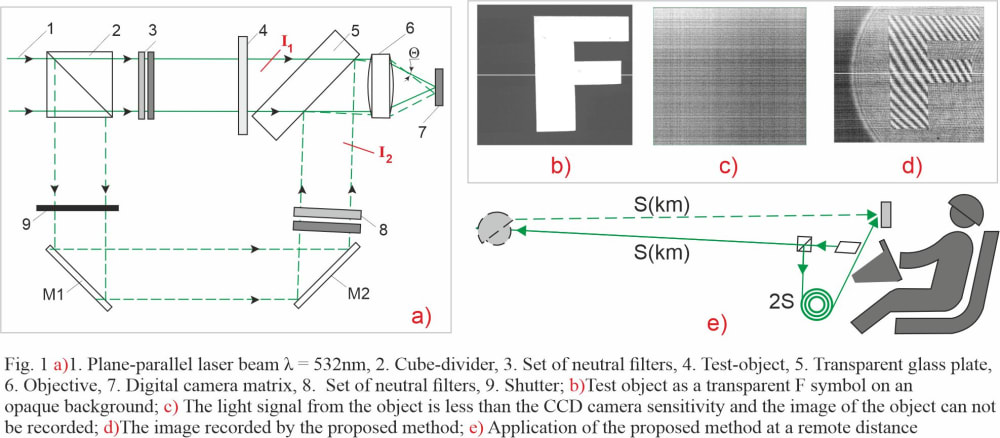The main idea of this project is to record an image from a remote distance when the intensity of the signal from the object is less than the threshold sensitivity of the CCD camera used. The plane-parallel coherent laser beam (1, Fig.1a) passes through the cube-divider (2) and is divided into two beams I1 and I2. The laser beam I1 illuminates the test-object (4). The signal from the object passes through the transparent glass plate (5) and the objective (6) and focuses on the matrix of the digital camera (7). The transparent symbol F on the opaque background is used as the test-object (Fig.1b). The second laser beam I2 is projected by mirrors onto the surface of the glass plate (5). The reflected from the plate signal is projected onto the matrix (7). The light intensity from the object is less than the camera's threshold sensitivity and nothing is visible on the screen (Fig.1c). The matrix of the digital camera is illuminated by the additional beam I2, which does not illuminate the test-object (4). As a rezult of the interferention of laser beams I1 and I2 the fringe pattern is formed and the image is formed from dark and light fringes. The intensity of the signal from object I1 remains unchanged, but the intensity of the additional beam I2 can be increased, and the intensity of the light fringes will be bigger than the light signal from the object. Now we can register and recognize the original object (Fig.1c). The images, at power densities from the object nine times less than the power density threshold for the digital camera used, can be recorded. Accurate calculations and detailed experiments are presented in the works[1-2]:
A. Chirita. Method and setup to increase power density threshold for image distinguishing by CCD camera. Optoelectronics and Advanced Materials - Rapid Communications, 2020,14(9-10), pp.389-392 (Link)
A. Chirita. Method for recording images of objects with illumination intensity less than the minimum sensitivity of the monochrome digital camera. Patent MD 4771
However, the coherence length of lasers usually does not exceed 50 meters. How to use this method from a remote distance (1-2 km)? The solution is depicted in Fig.1e. The laser beam is divided into two beams. The first beam passes the distance S(km) twice: to illuminate the object, and to return. The second beam is directed to a spool of optical fiber whose length is approximately 2S (km). Now, both beams have the same optical way, and coherence is maintained. The image of the object can be recorded and recognized from a remote distance using a device similar to Fig.1a. Both visible and infrared coherent laser radiation can be used.
Since the reflected signal from an object can be nine times less than the camera's threshold sensitivity [1-2], the object can be illuminated with a very weak signal (Fig. 1e). Such a weak signal may not differ from the background and the observed object will not notice it.
Like this entry?
-
About the Entrant
- Name:Arcadi Chirita
- Type of entry:individual

